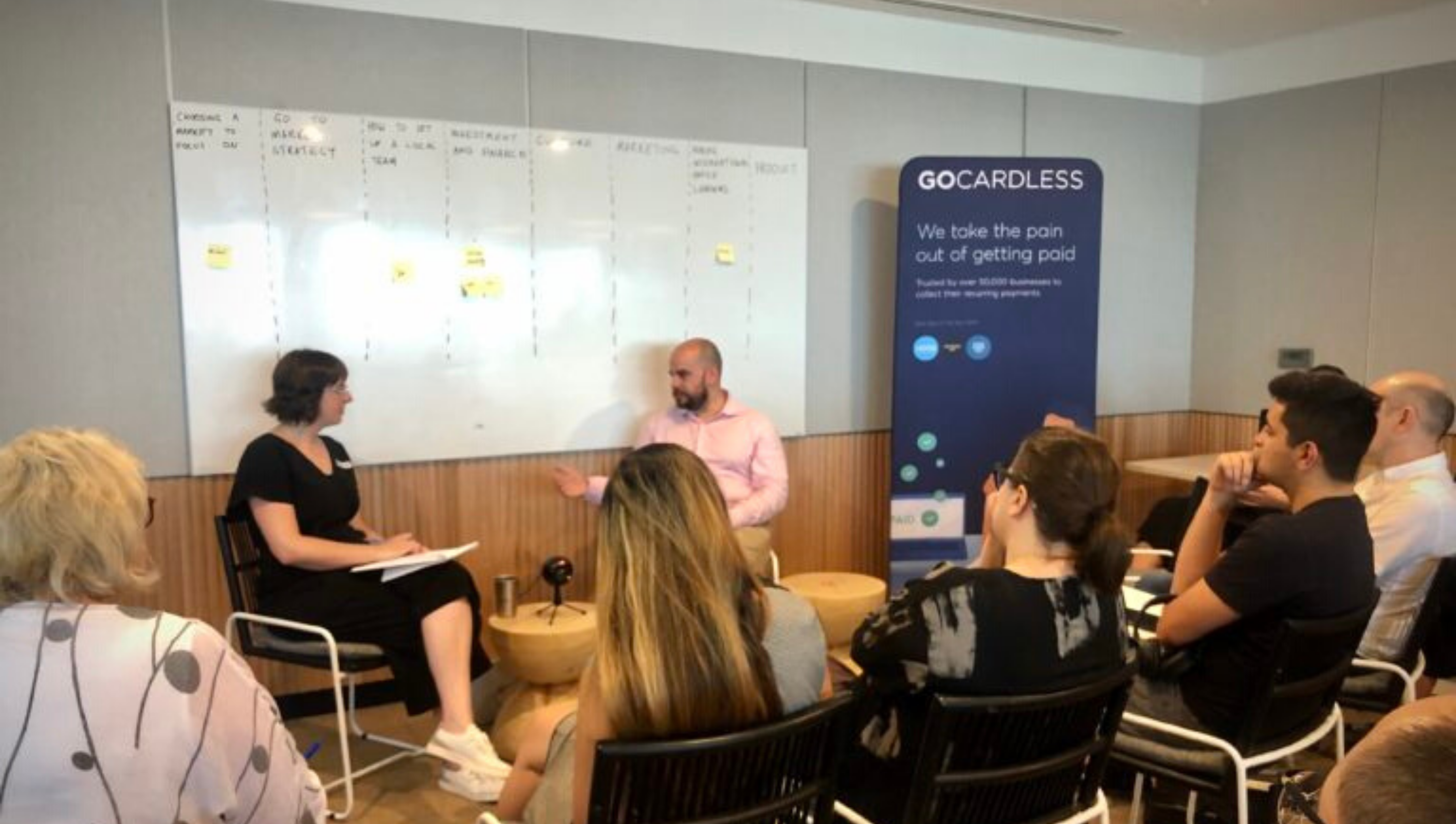Scaleup is a marathon, not a sprint says Carlos Gonzalez-Cadenas, COO GoCardless

Last editedMar 20203 min read
Carlos Gonzalez-Cadenas, COO at GoCardless, spoke with with Startup Victoria’s scale up founder members about his experience scaling global companies.
This article was originally published on startupvictoria.com
Startup Victoria’s Growth Club gives the founders of Melbourne the rare opportunity to hear from successful founders, technology executives and investors, so that they can learn about the secrets to their success (and their biggest mistakes).
This February’s guest was Carlos Gonzalez-Cadenas, COO at GoCardless, speaking with Startup Victoria’s scale up founder members about his experience scaling global companies and the importance of mastering your own psychology to secure success.
Carlos shared an open account of the struggles he faced and the most valuable lessons he learned along his journey from founder, to acquisition, and now to investor and mentor.
How Carlos turned the tide at GoCardless
When GoCardless Founder and CEO Hiroki Takeuchi spoke at a Growth Club in September last year, he said that a major turning point for them was when they stopped hiring ‘smart grads’ for senior roles, and began investing in experienced talent.
Their first big hire, he said, was Carlos.
Carlos came with a wealth of experience. He began his career as a founder of Fogg, where he would raise €3.5m before Skyscanner acquired it in 2013. From there, Carlos joined Skyscanner as CPO, and helped scale Skyscanner into a global business.
“Skyscanner was three years,” he said. “It was three years in real time but it felt more like 12 years. It was a crazy, crazy ride.”
While at Skyscanner, Carlos was focussed on driving three-dimensional growth. Their team grew from 200 to 1,500, one country to 30 countries, in only three years.
Carlos has used this experience to help GoCardless as they grow into the global company that they are today. GoCardless now has offices in the UK, USA, France, Germany and Australia and processes over $10b dollars annually, for over 50,000 businesses.

Carlos said that building a global business is challenging. This is true even for experienced business and their teams.
To overcome this challenge, he recommends that companies, “open the product in as many markets as possible, test the waters.”
This sounds risky. But by investing small amounts into a number of markets, businesses can distribute risk, rather than putting all eggs into a single basket. As Carlos points out, you can’t know where your successful markets are, until you’re there.
“Take for example, South Korea. It’s one of the most successful markets in the world for Skyscanner,” he said. “If you asked me at the beginning, what’s your rank of markets, I would never have said South Korea.”
The trick is, Carlos said, to test many markets with a minimum viable product that is localised to suit that market. It will soon become obvious which markets have the best product fit, and then you can start investing money with higher confidence in the returns.
Carlos acknowledges that this might not be as easily achieved for all companies. Factors like regulation, time zones, culture, language, and product type impact a company’s capacity to go global.
“Adding the offices is hard,” he said.
There isn’t a one-size-fits-all model for growing a business and founders need to build the ‘right machine’ for their business by taking their size and revenue per customer into account.
There is one thing, however, that is common to all businesses and one factor that affects all founders.
“Startups and scaleups are marathons,” Carlos said.
“A typical journey of a very successful company is 13, 14, 15 years. It takes a lot of time to build a billion dollar business. You can’t run a marathon in a series of sprints. You have to run a marathon.”
How to run the marathon
“There’s a lot of work to be done and there’s a lot of ups and downs. One thing that’s very important that you have to learn over time is managing your own psychology.”
“You need to take care of yourself. You need to rest."
He said that it’s important for founders to take care of themselves and avoid burnout. Even though many founders know, rationally, that it doesn’t do them any good to be run down and tired, large workloads mean that leaders end up working the long hours anyway.
Carlos said that leaders need to be better at asking for help from the people around them to alleviate their work loads.
“One thing I tended to do poorly in the early stage of my career was delegation.”
“You’re the founder, you care very intensely about your business and you think that you can do everything better than other people in the business. But in many cases this doesn’t matter and there are only a few things that you need to retain.”
He said that while others might not do things the way a founder would, or the way a founder likes them, it’s something that leaders need to, “make peace and be comfortable with.
“I think many entrepreneurs are perfectionists by nature,” he said. “You have to face that or that does kill a business.”
Carlos knows this is hard, but it’s something that founders work on and improve over time.
“At GoCardless I’m pacing myself a lot more and you achieve more by being healthier and making sure that you work intensely but not every hour.”
Carlos said that founders can work through this by overcoming doubt, and that this is something they can work through by coming together.
“It helped me a lot to talk with other founders and understand the problems are not unique,” he said. “As you’re around more other businesses you gain a bit more confidence but you also gain perspective that this is the normal thing.”

